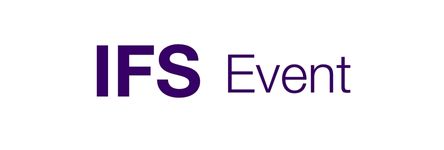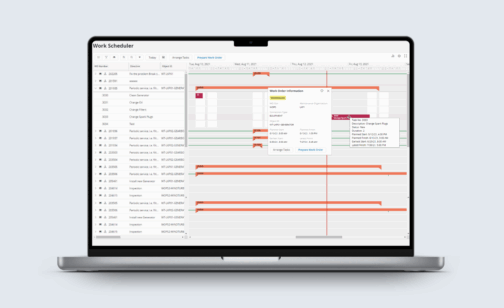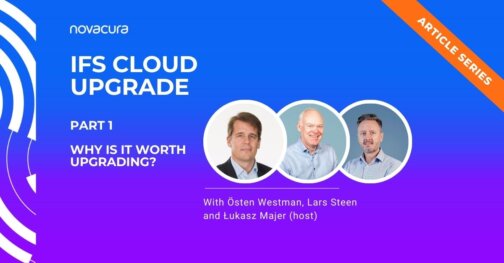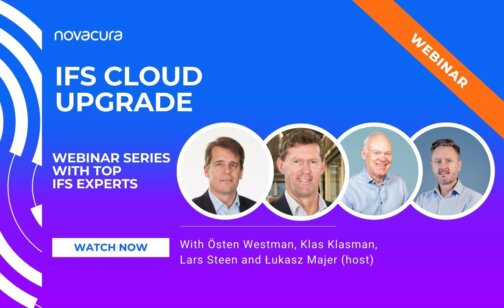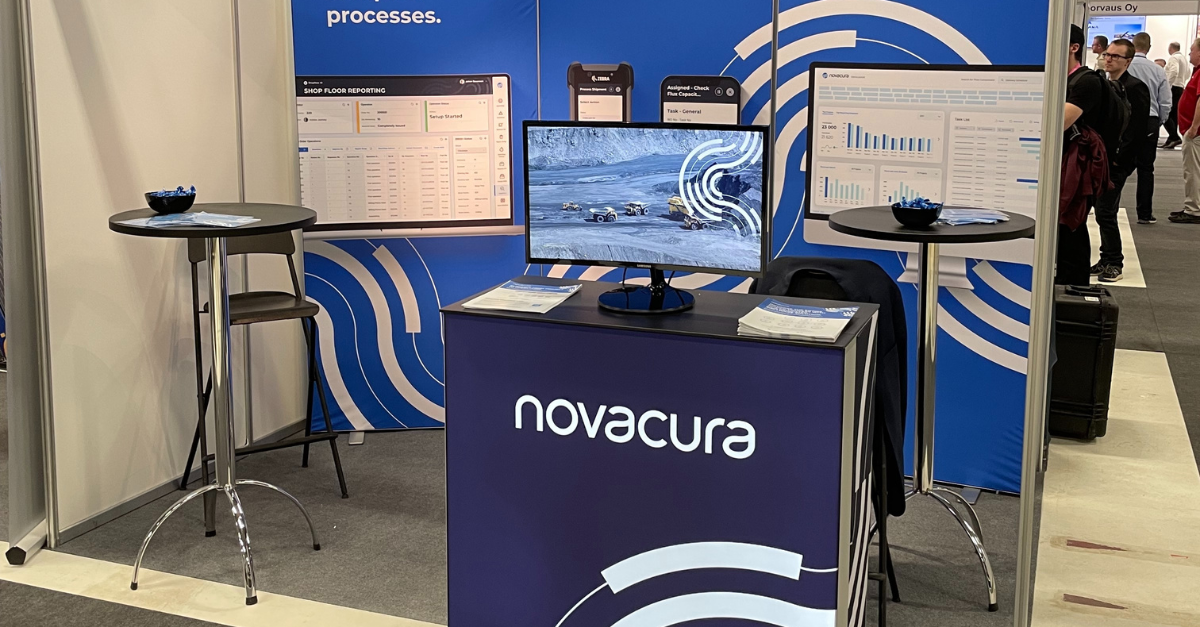Novacura at IFS Sales kickoff (SaKo) 2026
Novacura participated in the IFS Sales Kick-Off (SaKo) 2026 in Dallas, Texas—one of the key events in the IFS ecosystem. The summit highlighted the shift from traditional ERP to Autonomous Industrial AI and showcased strategic priorities like AI-driven sales, digital workers, and partner-driven growth. Insights from the event reinforce Novacura’s role in helping customers bridge advanced IFS AI capabilities with real-world operational needs using Novacura Flow.
learn more
7 Key Advantages of Implementing ERP in the Mining Industry
Mining demands huge upfront investment. Running a mine means managing expensive machinery, juggling complicated supply networks, meeting tough safety and environmental rules, and dealing with unpredictable market prices. A lot of mines don’t hit their targets — not because the rock is bad, but because their systems don’t talk to each other and decisions get made in silos. This is where IFS ERP for the mining industry makes a difference. Purpose-built for asset-heavy operations, IFS ERP provides an integrated platform that connects people, equipment, and processes — from the pit to the boardroom. Together with low-code extensions through Novacura Flow, mining companies gain the agility to boost efficiency today while preparing for the future. Here are seven key advantages of implementing IFS ERP in mining operations: 1. Real-Time Visibility Across Operations IFS delivers real-time dashboards unifying information from drill rigs, trucks, processing plants, and finance departments. This mining software eliminates silos, so managers no longer waste hours chasing spreadsheets or making phone calls. Instead, they get instant insight into production rates, equipment health, and fuel usage. Such visibility helps spot trends before they become costly — like declining ore grades or rising fleet consumption. With IFS, mines can resolve production bottlenecks faster while reducing downtime that directly affects profitability. 2. Optimized Equipment Maintenance Mining assets like crushers and ultra-class haul trucks cost millions. Unplanned breakdowns are profit killers. IFS ERP software for mining production includes advanced Enterprise Asset Management (EAM) that uses predictive analytics, automated scheduling, and complete maintenance histories. The result: fewer emergency repairs, longer component life, and annual savings reaching millions for mid-sized operations. Facilities can schedule interventions during planned windows, ensuring availability remains high. 3. Stronger Supply Chain and Logistics Control Mining supply chains span the globe — from explosives and tires to shipping concentrate overseas. An ERP like IFS shows a live, end-to-end view of orders, shipments, and stock. It also predicts what you’ll need from production and maintenance plans, helping you avoid stockouts. For outbound moves, it plans truck routes, rail slots, and port bookings to cut costs and keep output on schedule. 4. Integrated Financial and Project Management Finance in this sector is complex: royalties, multi-currency transactions, hedge accounting, and strict reporting requirements. Implementing IFS consolidates all information into a single financial truth. Automated royalty calculations, real-time cost per ton tracking, and project profitability analysis become standard. Activity-based costing even allows managers to compare expenses down to individual pits or blast patterns — supporting smarter, data-driven investment decisions. 5. Compliance, Safety, and ESG Management From regulations to environmental permits, compliance failures can stop production instantly. IFS automates these workflows with certification tracking, incident reporting, inspection scheduling, and full audit trails. The system also supports ESG reporting by monitoring emissions, waste management, and water quality. Mining industry software solutions like IFS ensure operations remain compliant, safe, and aligned with stakeholder expectations around sustainability. Why ERP implementations fail? Set the ERP implementation team Create an effective change management plan Communicate with diverse groups Download 6. Data-Driven Decision-Making and Predictive Analytics Facilities […]
learn more
IFS.ai Explained: Capabilities and Real-World Use in ERP Systems
Artificial intelligence is becoming an increasingly integrated part of modern ERP systems. Within IFS Cloud, IFS.ai offers a built-in suite of AI capabilities designed to support data analysis, automate workflows, and enable real-time decision-making. These features are embedded directly into the platform and available out of the box. This article takes a closer look at how IFS.ai contributes to operational efficiency within ERP environments. It also explores how low-code tools like Novacura Flow can extend and adapt these AI-driven capabilities to better fit the unique needs of different organizations. Understanding the Power of IFS.ai: Intelligent Decisions, Streamlined Operations IFS.ai is engineered to revolutionize business operations by offering a comprehensive suite of AI-driven features that enhance decision-making and optimize various functions. Here’s a closer look at its transformative capabilities: Optimized Efficiency: IFS.ai improves process efficiency and resource utilization, automating routine tasks and minimizing manual intervention. This leads to greater operational efficiency, freeing your workforce to focus on strategic initiatives. Ease of Implementation and Operation: A key advantage of IFS.ai is its embedded nature within the IFS Cloud, meaning it’s not a separate add-on but an integral part of the system. This “embedded, not bolted-on” approach simplifies deployment and reduces implementation complexities. Furthermore, the intuitive design, especially with features like the IFS.ai Copilot, makes it highly user-friendly. Employees can leverage AI-powered insights and tools without requiring extensive technical expertise, fostering rapid adoption and ensuring that the benefits of AI are accessible across all levels of the organization. Companies can explore and scale AI capabilities with clear value, without long lead times or complex implementations, enabling immediate and measurable results. Intelligent Decision-Making: By leveraging AI, IFS.ai transforms raw data into actionable insights across strategic, tactical, and operational levels. It supports enhanced decision-making through features like predictive maintenance in Enterprise Asset Management (EAM), intelligent financial management with AI-powered forecasting, and streamlined HR processes with AI-powered competency recommendations. Enhanced User Experience: The IFS.ai Copilot, a pivotal feature, offers AI-assisted guidance and timely knowledge, significantly improving decision-making and overall user experience. It can surface critical insights across the organization, assisting various roles from service leaders to production managers. Industry-Specific Applications: IFS.ai is embedded across key modules and tailored for specific industries, ensuring that the AI capabilities are highly relevant and impactful to diverse business needs. Read more on IFS.ai IFS.ai Integrations Across Key Modules and Capabilities IFS.ai delivers Artificial Intelligence across virtually all IFS Cloud capabilities, rather than being confined to specific, isolated modules. This pervasive integration means AI enhances functionality across: Enterprise Asset Management (EAM): Predictive maintenance, anomaly detection, FMECA (Failure Modes, Effects, Criticality Analysis) assistance. Field Service Management (FSM): Optimized scheduling, intelligent dispatch, service request routing, technician support. Manufacturing: Production scheduling optimization (MSO), demand planning, quality control, automated data capture from shop floor. Supply Chain Management: Inventory optimization, demand forecasting, logistics and transport planning. Finance: AI-powered forecasting, automated invoice processing, intelligent payment allocation. Human Capital Management (HCM): Competency and certificate recommendations, time management assistance. Projects: Project scheduling, risk assessment, resource allocation. Procurement: Supplier performance analysis, spend optimization. Sales & CRM: Sales […]
learn more
IFS Cloud Upgrade Series – Why is it Worth Upgrading? (part 1)
Answering the question about whether it’s worth upgrading now: Yes, it’s better to start working with IFS Cloud now and be part of its development! Östen Westman Sales Director (Business Systems) Introduction You are about to read the first article in our series of five blog posts on the IFS Cloud Upgrade projects. These articles have been written based on interviews with our experts and recorded in the form of webinars (see the end of the post). We recorded more than four hours of in-depth knowledge about IFS Cloud, all brought to you by our industry experts and gathered throughout the execution of more than 50 IFS-related projects. Discover optimal upgrade strategies alongside the challenges and solutions encountered in the field. In the first article, you will learn why leading businesses are transitioning to IFS Cloud. Gain insights into the direct benefits of this shift, including: Automatic updates, avoiding major future upgrades Scalable infrastructure for new branch integration Harmonious cloud service integrations Boosted performance and reliability Drastic cuts in on-premise IT expenses Understand the consequences of upgrade delays, support discontinuation for old versions, rising maintenance costs, and missed early adopter discounts. Meet the Experts Host: Łukasz Majer, Business Solutions & Marketing – (LM) Experts: Lars Steen, VP (Services Division) – (LS) and Östen Westman, Sales Director (Business Systems) – (OW) Why have ERP in the cloud? – MARKET TRENDS Lukasz Majer (LM): Why now is the right time to consider a cloud upgrade for the ERP systems? Could you quickly describe the situation in the market? Are all the major ERP vendors already in the cloud? Lars Steen (LS): If you take a tour through the websites of major ERP players today, you will see “cloud” mentioned all over. Cloud is the primary message for everyone. This trend started more than 10 years ago with solutions like Salesforce and NetSuite, which were built natively for the cloud. Now, all the major players—SAP, Infor, IFS, Microsoft—are producing cloud solutions. There are various reasons for this, including different business models and agreements, but the general direction is clear: cloud is the future. One reason for this is that shifting to the cloud is more cost-efficient for vendors, allowing them to focus their development resources on fewer releases. However, a major driver is the shift in business models. The cloud enables vendors to offer subscription-based models, moving away from the old perpetual license models. This transition stabilizes the company, providing a reliable revenue stream and allowing for better future planning and investment. Additionally, the move to fewer releases means vendors only need to maintain one version of the software, significantly reducing the complexity and cost of supporting multiple versions simultaneously. Long-term, a single-version strategy is the future of ERP in the cloud. LM: We’ve discussed the benefits from the ERP vendor perspective. How about from the customer’s point of view? LS: There are several benefits from the customer perspective as well. The big conceptual change is moving from updating your solution every five or seven years to […]
learn more
IFS Cloud upgrade – ultimate guide
Most ERP users who are not already in the Cloud are likely considering migration. We’ve consulted our top experts to understand why upgrading is worth it, what the best strategies are, and how to plan the entire project. In our new series of webinars, we focus on upgrading to IFS Cloud, aiming to highlight all the pros and cons of the process. Join us and embark on a journey of IFS cloud upgrade! Subscribe to IFS Cloud Upgrade Webinars IS NOW THE RIGHT TIME TO UPGRADE? In the webinar series, we explore the landscape of major ERP players. The cloud has become the primary focus, with SAP, IFS, Microsoft, and others adopting cloud solutions. In this opening episode, our experts Łukasz Majer, Lars Steen and Östen Westman dive deep into the world of ERP, sharing invaluable insights on the benefits of migrating to IFS Cloud, market trends, and the compelling reasons for cloud adoption. Drawing on over 50 IFS projects, we highlight the evolution of ERP systems into the cloud era, emphasizing that it’s not just a trend but a strategic shift embraced by the industry. But the journey to the cloud isn’t a one-size-fits-all narrative. We learn that IFS entered the cloud realm in 2021, a strategic move occurring five years after some of its competitors. However, this timing offers IFS a unique advantage – the ability to learn from early adopters and fine-tune their approach. As the conversation deepens, our experts address the origins of the cloud revolution, acknowledging pioneers like Salesforce and NetSuite, and elaborat on why ERP systems, despite being more complex, have been latecomers to the cloud journey. So, if you’re contemplating an ERP cloud upgrade or just keen on understanding the dynamics of this transformative shift, join us in this series as we navigate the cloud landscape! It’s not just about technology; it’s about a strategic move that could reshape the way your business operates in the digital era. IFS CLOUD UPGRADE UPCOMING WEBINARS Novacura is thrilled to present a series of five insightful webinars designed for clients interested in an IFS Cloud upgrade project. The series will consist of 5 webinars, where our experts are going to take you through the entire upgrade process. You will learn: Why is it worth upgrading?… What are the possible upgrade strategies? What are observed challenges and proposed solutions? (Technical) What are observed challenges and proposed solutions? (Organizational) How to plan the IFS Upgrade project? Join us for the webinar series! Don’t miss this unique opportunity to enhance your understanding of the IFS Cloud upgrade process. REGISTER TODAY AND GAIN ACCESS TO ALL EPISODES OF THE IFS CLOUD UPGRADE SERIES
learn more
Novacura at Euro Mine Expo 2022
Euro Mining Expo in Skellefteå took place in June, a trade fair for the mining industry and its suppliers. The fair was crowded with booths from the suppliers and people from the mining industry seeking new solutions for their companies. A conference was taking place discussing future possibilities and challenges in the industry. Novacura was naturally there as one of the suppliers of software, discussing the possibilities to support the mining industry with leaner business processes for their ERP solutions with IFS Applications and Novacura Flow for process improvements, integrations and mobile solutions, as well as discussing the same aspects with companies using other ERP solutions.Ricard Lindgren and Calle Göras from Novacura attended the whole week and met with many people at the booth discussing the business processes and their challenges. We met some key contacts and had inspiring discussions around mobility, integration and the solution we offer for the industry. Ricard Lindgren Novacura, Sr. Solution Architect The week was soon over, and we hope that people who visited our booth enjoyed the discussions and got a deeper understanding of what Novacura can do with Novacura Flow and IFS Applications or other ERP solutions. Want to learn more about what Novacura can do for the mining industry? Click here to learn more about Optimizing the entire Mining process with our ERP Applications Related articles : IFS Partner Day Warsaw – A new chapter for Novacura’s presence in Poland learn more IFS Customer Day Finland 2024: Preparing for Evergreen with Novacura learn more Tomorrow Logistics Conference, Poznan – ‘Just in Sequence’ Strategy Case Study learn more Implementing IFS Cloud at Söderenergi – leading Swedish power heating supplier learn more More articles
learn more

